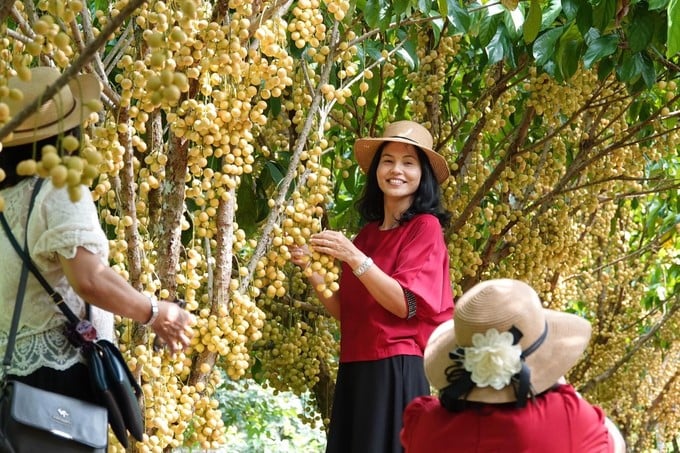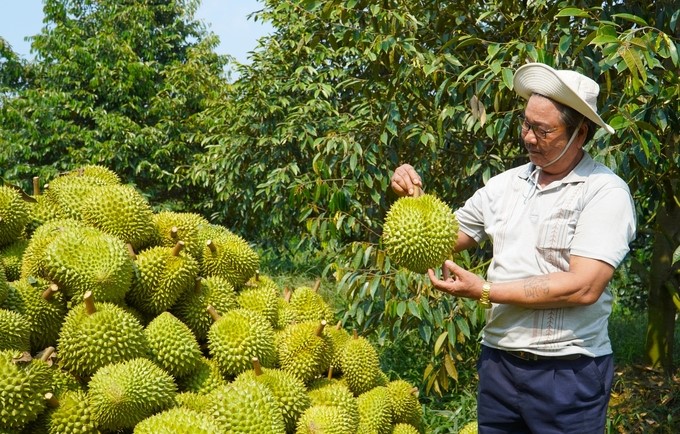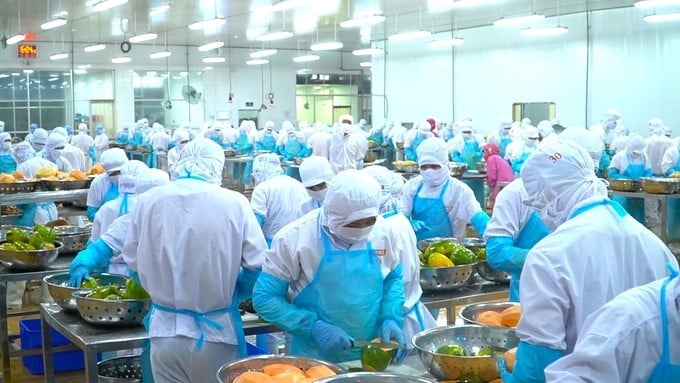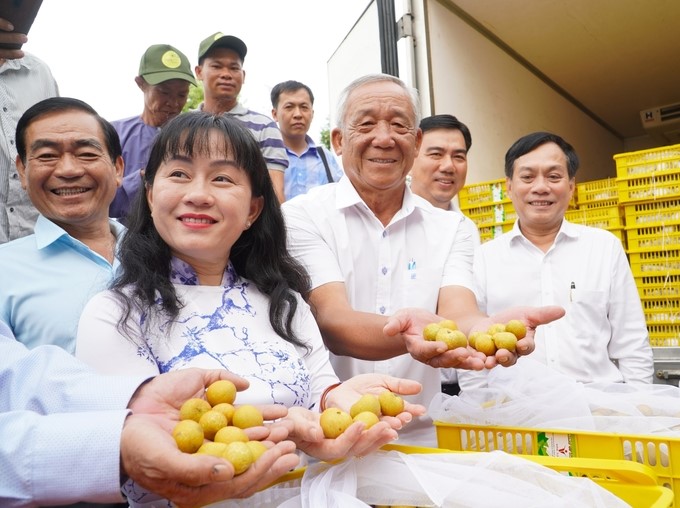June 22, 2025 | 09:00 GMT +7
June 22, 2025 | 09:00 GMT +7
Hotline: 0913.378.918
June 22, 2025 | 09:00 GMT +7
Hotline: 0913.378.918
Compared to other regions across the country, the Mekong Delta is assessed as an area facing many disadvantages in fruit production.
According to Mr. Le Thanh Tung, Deputy Director of the Department of Crop Production (Ministry of Agriculture and Rural Development), the cause of this actual situation is previous production tradition and small scale. Even it is difficult to have a concentrated raw material area of about 10 hectares to issue a growing area code when needed.
Among the current trends in fruit tree development, the Mekong Delta region is forming a trend of growing indigenous trees, specific to each locality.

Mr. Le Thanh Tung, Deputy Director of the Department of Crop Production (Ministry of Agriculture and Rural Development). Photo: Kim Anh.
Mr. Tung determined that indigenous fruits will eventually become a precious commodity because they cannot be acclimatized. This is the value that farmers need to retain.
Ha Chau strawberry is known as one of the specialty fruits of Phong Dien land (Can Tho City), with an area of nearly 300 hectares. Since 2006, Ha Chau Strawberry has been granted a geographical indication certificate by the Intellectual Property Office of Vietnam (Ministry of Science and Technology).
Mr. Tung said that Phong Dien's Ha Chau strawberry trees planted in Tien Giang or Long An province cannot be as delicious as those grown in Phong Dien. Especially, there is a lack of the locality's 200-year history of tree planting.
Sharing the same opinion, Mr. Tran Thai Nghiem, Deputy Director of the Department of Agriculture and Rural Development of Can Tho City, said that in recent few years, with the hot development of durian trees, especially in the 2023–2024 crop year, durian prices have been quite high and many gardens have earned great profits.
From here, there appeared a phenomenon of people replacing Ha Chau strawberry trees or some other indigenous tree species to grow durian. This leads to risks for durian trees while also losing the traditional value that indigenous fruit tree species bring.

Ha Chau strawberry, a specialty fruit of Phong Dien district (Can Tho City), not only helps farmers develop the garden economy but also promotes local agricultural tourism. Photo: Kim Anh.
Therefore, in Can Tho City's Development Planning for the 2021–2030 period, with a vision to 2050, the city determines to continue expanding the area of fruit trees, both promoting economic development and forming ecosystems, thereby contributing to urban development. Of which, focus on exploiting indigenous fruit tree species associated with market needs and businesses.
Currently, Can Tho City has over 25,000 hectares of fruit trees, yielding more than 200,000 tons/year. In recent years, this area has been constantly expanding. Many species of indigenous fruit trees have formed key, concentrated, branded production areas such as: Ha Chau strawberry; green-skinned mango from Hau River; Dinh Mon longan, etc.

The fruit industry has been identified by the Department of Agriculture and Rural Development of Can Tho City as one of the three important pillars of the agricultural sector, besides rice and fisheries. Photo: Kim Anh.
In addition to contributing to adding value to the agricultural sector, Mr. Nghiem affirmed that orchards are a factor promoting the development of services, tourism, the processing, preservation, export industry, and OCOP products.
In the fruit industry development strategy, all districts in Can Tho City, Phong Dien district, and part of Thoi Lai and Co Do districts have formed concentrated fruit tree areas. The development of this industry not only supports agricultural economic development but also builds ecosystems that promote urban development.
In addition to the role of regulating policies of the agricultural sector and specialized agencies, the sense of responsibility of farmers plays a decisive role in preserving and maintaining the locality's indigenous and traditional fruit tree species.
Recently, at the Talkshow "Developing sustainable fruit production and consumption chains" organized by the Department of Agriculture and Rural Development of Can Tho City in coordination with the Department of Crop Production, the Plant Protection Department (Ministry of Agriculture and Rural Development), and the Co Do District People's Committee, specialized agencies, businesses, and farmers all paid attention to production linkages for sustainable fruit development.
Vietnamese fruits are present in more than 60 countries and territories, especially in large markets such as the US, Japan, South Korea, New Zealand, Australia, China, etc. The export turnover of fruits in 2023 reached about USD 5.6 billion.

Orchards are a factor promoting the development of the processing, preservation, and export industry. Photo: Kim Anh.
Mr. Le Thanh Tung, Deputy Director of the Department of Crop Production, added that many farmers currently join cooperatives and link with businesses, including cooperatives qualified for direct export. Linkage aims to maintain product quality and intensive farming and is a modern trend.
This trend is developing quite well in the Southeast and Central Highlands regions. However, the Mekong Delta is still slow, and the region's fruit export output does not account for much of the country's export value.
Each market now has its own very strict import regulations and standards. Typically, the US and Australia both set the most basic requirement that fruits must have growing area codes and packaging facility codes. At the same time, before being exported, the product must go through an irradiation system to disinfect and be packaged properly. In contrast, in the Canadian market, basically all goods that do not need to be negotiated are exported to. The South Korean market requires fruits to be heat treated.
Therefore, businesses must coordinate very closely with farmers and produce according to the requirements of each market. Besides, to form a linkage chain, farmers also need to have a certain understanding of that market.

To promote sustainable development of the fruit industry, businesses and farmers need to coordinate closely and produce according to market requirements. Photo: Kim Anh.
Mr. Tran Thai Nghiem, Deputy Director of the Department of Agriculture and Rural Development of Can Tho City, said that in recent years, the issue of consumption linkage for Can Tho City's fruit industry has been quite bustling. Many valuable trees, such as durian, star apple, mango, longan, etc., are of great interest to businesses. When establishing growing area codes, businesses all wish to link up to build raw material areas to serve the export market. From there, a number of quite close chains are formed.
However, there are still some large-scale fruit trees that cannot be linked due to many production and market factors. Besides, some linkages are not close; businesses sign contracts through cooperatives, so the legal binding between businesses and farmers is not high. When product prices increase, farmers cannot sell to businesses because the agreement is not harmonious, causing the phenomenon of traders competing to buy and sell. This raises many problems in the linkage in the fruit industry.
Translated by Thu Huyen
![Turning wind and rain into action: [9] Digitizing hydrometeorological data in response to climate change](https://t.ex-cdn.com/nongnghiepmoitruong.vn/608w/files/news/2025/06/17/z6704423696987_15fd32ffc26d590d204d520c9dac6786-nongnghiep-165943.jpg)
(VAN) Farmers have begun accessing hydrometeorological applications to adjust their cropping schedules, aiming to ensure productivity and adapt to climate change.
![Turning wind and rain into action: [8] Real-time salinity detection and early warning technology](https://t.ex-cdn.com/nongnghiepmoitruong.vn/608w/files/news/2025/06/17/z6704423696987_15fd32ffc26d590d204d520c9dac6786-nongnghiep-151127.jpg)
(VAN) Thanks to the integration of modern hydrological-hydraulic models, remote sensing technologies, and artificial intelligence, the accuracy of hydrological forecasting has significantly improved.
![Turning wind and rain into action: [7] Early disaster warnings help marine farmers minimize losses](https://t.ex-cdn.com/nongnghiepmoitruong.vn/608w/files/news/2025/06/17/z6704423696987_15fd32ffc26d590d204d520c9dac6786-nongnghiep-142942.jpg)
(VAN) In recent years, thanks to early disaster warnings and forecasting, marine farmers in Khanh Hoa province have been able to reduce risks and losses, thereby improving production efficiency.
![Turning wind and rain into action: [6] ‘Four on-the-spot’ disaster management software](https://t.ex-cdn.com/nongnghiepmoitruong.vn/608w/files/news/2025/06/17/e5a48259d6a262fc3bb3-nongnghiep-183800.jpg)
(VAN) By simply activating the scenario on the disaster management software, the relevant authorities immediately know how many households need to be evacuated, where to evacuate them to, and by what means of transportation…
![Turning wind and rain into action: [5] Hue applies modern technology in disaster forecasting](https://t.ex-cdn.com/nongnghiepmoitruong.vn/608w/files/news/2025/06/17/z6704423696987_15fd32ffc26d590d204d520c9dac6786-nongnghiep-093938.jpg)
(VAN) In Hue city, modern technology has recently been applied in meteorological and hydrological forecasting and warning, helping to reduce the damage caused by natural disasters.

(VAN) A cutting-edge farming technique being implemented on an experimental ranch in Arizona's Sonoran Desert has already saved a billion gallons of water over five years, according to Civil Eats.

(VAN) Poultry and pig production and the environment can be boosted through enhanced water technology, according to new research.